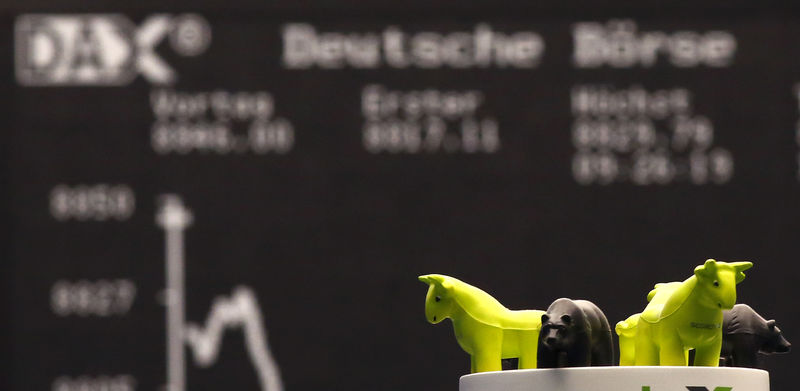By Peter Nurse
Investing.com - European stock markets slumped Monday, with the DAX in Germany entering a bear market, as soaring crude prices triggered concerns of a major inflationary shock for the global economy.
By 4:10 AM ET (0910 GMT), the DAX in Germany traded 3.5% lower, dropping more than 20% from its peak, while the CAC 40 in France slumped 3.2% and the U.K.’s FTSE 100 fell 2.1%.
This follows comments from U.S. Secretary of State Antony Blinken, who said on Sunday that the Biden administration was in “very active discussions” with European governments about banning imports of Russian crude and natural gas.
Oil prices, already elevated after Russia’s invasion of Ukraine more than a week ago, climbed to levels last seen in July 2008 as the market adjusted to the potential of Russia’s supply no longer being available.
Russia is the world's top exporter of crude and oil products combined, with exports at around 7 million barrels per day, or 7% of global supply.
By 4:10 AM ET, U.S. crude futures traded 6.9% higher at $123.69 a barrel, while the Brent contract rose 7% to $126.32.
Oil prices posted their largest weekly gains since mid-2020 last week, with the Brent benchmark up 21% and U.S. crude gaining 26%.
This sharp rise has raised concerns about the impact on global economic growth and inflation, particularly with many of the world’s major central banks looking to raise interest rates to cope with soaring consumer prices.
The European Central Bank meets later this week, and these surging commodity prices complicate the central bank’s policy picture.
The ECB is expected on Thursday to stick to its plans to end asset purchases under its Pandemic Emergency Purchase Program, while doubling asset-buying under its longer running Asset Purchase Program in the second quarter.
In corporate news, Credit Agricole (OTC:CRARY) stock fell more than 8% after the French lender revealed $7 billion worth of exposure to Russia and Ukraine.
On a broader look, European oil and gas stocks, as well as miners, jumped sharply on the back of the soaring commodity prices, while retailers, automakers, and banks fell sharply.
Providing a modicum of comfort, German retail sales climbed 2% on the month in January, up 10.3% on the year, while German factory orders rose 1.8% in January.
Additionally, gold futures rose 1.7% to $2,000.05/oz, while EUR/USD traded 0.5% lower at 1.0867.
